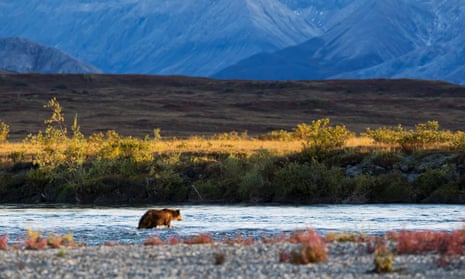Years ago, camping in Alaska’s Arctic national wildlife refuge, I watched a herd of caribou – 100,000 bulls, cows and their three-week-old calves – braid over the tundra, moving to a rhythm as old as the wind.
“Not many places like this left today,” said my friend Jeff, sitting next to me above an ice-fringed river.
And so Alaska senator Lisa Murkowski believes this refuge – 80 miles east of Prudhoe Bay – could generate $1bn over 10 years once it’s opened to oil leasing. She and her Republican colleagues slipped this drilling provision into the Senate Republican tax bill.
Murkowski repeatedly says this development would cover just 2,000 acres, “about one ten-thousandth of ANWR”.
The acronym ANWR conveniently deletes the words “wildlife” and “refuge”, with no regard for the polar bears, Arctic fox, musk oxen and migratory ground-nesting birds that come there every summer, some species from as far away as Patagonia.
Alaska’s lieutenant governor, Byron Mallott, has said that drilling in ANWR is necessary to deal with climate change. His caddywhompus logic: we need to drill for more oil to raise money to address a problem that’s caused by humanity’s addiction to oil. Why not just say the truth? We want the money.
Murkowski adds: “We have waited nearly 40 years for the right technology to come along for a footprint small enough for the environment to be respected.” They have not.
Alaskans have been trying to drill here for decades, using one crazy rationale after another. At one hearing the state’s lone congressman, Don Young, put a blue pen mark on his nose to show how small the industry footprint would be. Clever man. The development would in fact be a spider web of roads, pipelines, well pads and landing strips smack in the middle of the biological heart of the refuge. It would look less like a refuge and more like Prudhoe Bay, where thousands of spills have been reported.
Senator Maria Cantwell of Washington says the whole idea is “ludicrous”, noting that the Republican tax plan would add roughly $1.5tn to the national deficit in five years [with the richest 1% of Americans reaping half of the tax cuts]. “I am disturbed,” she says. She should be.
Christopher Lewis, a retired BP manager of exploration, has said: “I do not believe that there are any adequate, commercially viable reservoirs in the Arctic refuge.” The reality is “there are other less sensitive and less costly places to explore”.
Meanwhile, the congressionally mandated Climate Science Special Report announced recently that nearly all global warming since 1951 has been caused by humans, with 2014-16 the hottest years on record.
Atmospheric carbon dioxide (CO2, a heat-trapping gas produced by burning oil and coal) now exceeds 403 parts per million (ppm), the highest by far in the past 800,000 years (that averaged 170-280ppm). And it’s rising. Christiana Figueres, a former United Nations climate chief, predicts that we have only three years left to “bend the [carbon] emissions curve downward” and mitigate a series of runaway global catastrophes.
Shell and BP expect global temperatures to rise as much as 5C by 2050. Senator Murkowski acknowledges this, but remains committed to drilling, as do others. She never asks Alaskans to sacrifice; never compels them to get innovative and be truly independent. Why not lead the world into the clean energy revolution? Go solar and tidal. Alaska has massive tides.
Don Young no doubt wiped that blue mark off his nose after the hearing. Do not mistake his cleverness for wisdom. He knows the cost of everything and the value of nothing. The esteemed scientist Jane Goodall sent a letter to every member of the US Senate urging them to vote no on this, adding that the refuge’s “very wildness speaks to our deeply rooted spiritual connection to nature, a necessary element of human psyche”.
On that special day – one of the best of my life – the caribou flowed past Jeff and me as if in a dream. I wondered then as I do now: when they return, what will they find?
- Kim Heacox is the author of a dozen books, most recently the novel Jimmy Bluefeather, winner of the National Outdoor Book Award. He lives in Alaska
